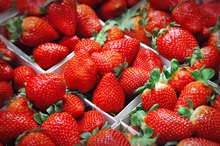What does fact checked mean?
At Healthfully, we strive to deliver objective content that is accurate and up-to-date. Our team periodically reviews articles in order to ensure content quality. The sources cited below consist of evidence from peer-reviewed journals, prominent medical organizations, academic associations, and government data.
- Mayo Clinic: Gout: Lifestyle and Home Remedies
- National Institute of Arthritis and Musculoskeletal and Skin Diseases: Gout
The information contained on this site is for informational purposes only, and should not be used as a substitute for the advice of a professional health care provider. Please check with the appropriate physician regarding health questions and concerns. Although we strive to deliver accurate and up-to-date information, no guarantee to that effect is made.
Home Remedies for Gout Flare Ups
Gout is a form of arthritis that is characterized by sudden, severe attacks of pain, redness and tenderness in the joints–often in the big toe. Attacks generally last three to 10 days, followed by pain-free periods before the next flare-up occurs. Although there is no cure for gout, taking prescribed medications and making lifestyle changes can help to alleviate the pain of flare-ups, prevent future attacks, and avoid long-term damage to your joints. Always check with your health care provider before trying home remedies for gout flare-ups.
If you are experiencing serious medical symptoms, seek emergency treatment immediately.
Drink Plenty of Fluids
Gout is caused by a buildup of uric acid in the body. The Mayo Clinic recommends drinking eight to 16 cups of fluid a day, at least half of it water, to flush uric acid out of the body and alleviate the symptoms of gout 1. Alcohol inhibits uric acid excretion, so avoid it during attacks. Drinking coffee—regular or decaffeinated—may be associated with lower uric acid levels, but more research is needed to determine its role, if any, in the management of gout symptoms.
- Gout is caused by a buildup of uric acid in the body.
- Drinking coffee—regular or decaffeinated—may be associated with lower uric acid levels, but more research is needed to determine its role, if any, in the management of gout symptoms.
Improve Your Diet
Strawberries for Gout
Learn More
Uric acid is a byproduct of the breakdown of purines, chemicals that occur naturally in the body and in certain foods. Eating a balanced diet and limiting purine-rich foods—including red meats, organ meats, herring, mackerel, mussels, lentils, dried peas, asparagus, spinach, mushrooms and yeast—can help to alleviate gout symptoms and prevent future attacks. Adding antioxidant foods such as dark-colored fruits (blueberries, cherries, and tomatoes) and certain vegetables (squash and bell peppers) can lower uric acid and prevent gout attacks, according to the University of Maryland Medical Center 3.
Be Careful with Supplements
Vitamin C supplements may reduce uric acid levels in the blood, says the Mayo Clinic, but it hasn’t been studied as a specific remedy for gout. Omega-3 fatty acids may help to decrease inflammation, but should be avoided if you are taking blood thinners, including aspirin. Avoid taking vitamin A and niacin, which may trigger gout attacks. Check with your health care provider about the recommended doses of any supplement you are considering before adding to your diet.
- Vitamin C supplements may reduce uric acid levels in the blood, says the Mayo Clinic, but it hasn’t been studied as a specific remedy for gout.
Consider Herb Teas
Are Radishes Good for Gout?
Learn More
According to the University of Maryland Medical Center, teas made of certain herbs—separately or in combination—can be helpful in managing gout symptoms 3. For inflammation, try turmeric, bromelain, cat’s claw and devil’s claw. Cranberry supports kidney health, and cat’s claw reduces inflammation, supports immunity and has antibacterial and antifungal effects.
Relax
Meditation, deep breathing exercises and other relaxation techniques may help to manage the pain of gout flare-ups. Walking and other regular exercise routines help to relieve stress as well.
Apply Some Heat (and Cold)
Try alternating hot compresses for three minutes with a cold compress for 30 seconds for pain relief and improved circulation. Nettle tea compresses may also be effective, according to the University of Maryland Medical Center 3.
Related Articles
References
- Mayo Clinic: Gout: Lifestyle and Home Remedies
- National Institute of Arthritis and Musculoskeletal and Skin Diseases: Gout
- University of Maryland Medical Center: Gout
- National Institute of Arthritis and Musculoskeletal and Skin Diseases. Gout. Updated April 2016.
- Zhang Y, Chen C, Choi H, et al. Purine-rich foods intake and recurrent gout attacks. Ann Rheum Dis. 2012; 71(9):1448-53. doi:10.1136/annrheumdis-2011-201215
- Fischer E. Ueber die Harnsauer. 1 [On Uric Acid. 1]. Berichte der Deutschen Chemischen Gesellschaft. 1884: 17:328-338. doi:10.1002/cber.18980310304
- Ragab, G., Elshahaly, M., & Bardin, T. (2017). Gout: An old disease in new perspective – A review. Journal of Advanced Research, 8(5), 495–511. doi:10.1016/j.jare.2017.04.008
- Centers for Disease Control and Prevention. Gout. Updated January 28, 2019.
- Zgaga, L., Theodoratou, E., Kyle, J., Farrington, S. M., Agakov, F., Tenesa, A., … Campbell, H. (2012). The Association of Dietary Intake of Purine-Rich Vegetables, Sugar-Sweetened Beverages and Dairy with Plasma Urate, in a Cross-Sectional Study. PLoS ONE, 7(6), e38123. doi:10.1371/journal.pone.0038123
- Choi HK, Gao X, Curhan G. Vitamin C intake and the risk of gout in men: a prospective study. Arch Intern Med. 2009;169(5):502–507. doi:10.1001/archinternmed.2008.606
- Zhang Y, Neogi T, Chen C, Chaisson C, Hunter DJ, Choi HK. Cherry consumption and decreased risk of recurrent gout attacks. Arthritis Rheum. 2012;64(12):4004–4011. doi:10.1002/art.34677
- Arthritis Foundation. Gout Diet: Dos and Don’ts.
- Boban M, Modun D. Uric acid and antioxidant effects of wine. Croat Med J. 2010;51(1):16–22. doi:10.3325/cmj.2010.51.16
- Caliceti C, Calabria D, Roda A, Cicero AFG. Fructose Intake, Serum Uric Acid, and Cardiometabolic Disorders: A Critical Review. Nutrients. 2017;9(4):395. Published 2017 Apr 18. doi:10.3390/nu9040395
- U.S. Department of Health and Human Services and U.S. Department of Agriculture. 2015–2020 Dietary Guidelines for Americans. 8th Edition. Published December 2015.
- U.S. Department of Health and Human Services. Gripped by Gout. NIH News in Health. Published February 2014.
- Kakutani-Hatayama M, Kadoya M, Okazaki H, et al. Nonpharmacological Management of Gout and Hyperuricemia: Hints for Better Lifestyle. Am J Lifestyle Med. 2015;11(4):321–329. Published 2015 Sep 2. doi:10.1177/1559827615601973
Writer Bio
Marcy Brinkley has been writing professionally since 2007. Her work has appeared in "Chicken Soup for the Soul," "Texas Health Law Reporter" and the "State Bar of Texas Health Law Section Report." Her degrees include a Bachelor of Science in Nursing; a Master of Business Administration; and a Doctor of Jurisprudence.









